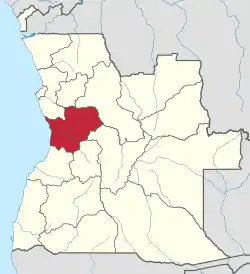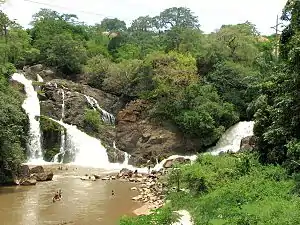Cuanza Sul Province
Cuanza Sul Province (Umbundu: Kwanza Kombuelo Volupale) is a province of Angola. It has an area of 55,660 square kilometres (21,490 sq mi) and a population of 1,881,873.[2] Sumbe is the capital of the province. Don Francisco Inocêncio de Sousa Coutinho founded the province in 1769 as Novo Redondo.
Cuanza Sul | |
|---|---|
 Cuanza Sul, province of Angola | |
| Country | |
| Capital | Sumbe |
| Government | |
| • Governor | Job Pedro Castelo Capapinha |
| • Vice-Governor for the Political, Economic and Social Sector | Joaquim Ricardo de Almeida Júnior |
| • Vice-Governor for Technical Services and Infrastructures | Demétrio António Bráz de Sepulveda |
| Area | |
| • Total | 55,600 km2 (21,500 sq mi) |
| Population (2014 census) | |
| • Total | 1,881,873 |
| • Density | 34/km2 (88/sq mi) |
| ISO 3166 code | AO-CUS |
| HDI (2018) | 0.445[1] low · 18th |
| Website | www |
History
The province was badly affected during the Angolan Civil War (1975–2002). A large number of civilians were killed in the clashes between National Union for the Total Independence of Angola (UNITA) and Angolan Armed Forces (FAA). Coffee plantations and fields were destroyed. Frequent attacks forced people to leave their municipalities. UNITA had opened its central front in the province.[3][4] Around 116,000 displaced people were living in camps. The majority of them were from the rural areas and the densely populated plateau regions.[5] On 17 December 2000, the UNITA combatants killed 31 FAA soldiers and looted vehicles, arms and about 20,000 litres of diesel in Quibala.[6] In April 2001 they attacked FAA outposts and captured firearms.[7]
Landmines laid during the civil war are still present and contracts to clear them were given to different organisations.[8] They are still present in several areas.[9] The province has a high density of landmines.[10] In 2008 the province's Maria Restino Manuel was declared the Internet winner of Miss Landmine 2008. She had secured 29% of the online votes.[11]
Geography

Kibalas, N'goias, Musseles, Mussumbas and Bailundos are the major ethnic groups in the province. The Kimbundu language is most commonly used.[12] Umbundu is also spoken.[13] Bengo Province and Cuanza Norte Province are located to its north.[14] Malanje and Bie Provinces are located to its east, while Huambo and Benguela provinces border it in south. The province's coastline on the Atlantic Ocean is 180 kilometres (110 mi) in length. Cuanza Sul city lies on the southern bank of the Cuanza River.[14]
Municipalities
Within Cuanza Sul Province includes the following municipalities:
Communes
The province of Cuanza Sul contains the following communes (comunas); sorted by their respective municipalities:
- Amboim Municipality: – Assango, Gabela
- Cassongue Municipality: – Atome, Cassongue, Dumbi, Pambangala (Pampangala)
- Conda Municipality: – Conda, Cunjo
- Ebo Municipality: – Condé, Ebo, Kassange (Quissanje)
- Libolo Municipality: – Cabuta (Kabuta), Calulo, Munenga, Quissongo (Kissongo)
- Mussende Municipality: – Mussende, Quienha (Kienha), São Lucas
- Porto Amboim Municipality: – Capolo (Kapolo), Porto Amboim
- Quibala Municipality: – Cariango (Kariango), Dala Cachibo, Lonhe, Quibala (Kibala)
- Quilenda Municipality: – Quilenda (Kilenda), Quirimbo (Kirimbo)
- Seles Municipality: – Amboiva, Botera, Seles
- Sumbe Municipality: – Gangula (Ngangula), Gungo, Quicombo (Kicombo), Sumbe
- Waku-Kungo (Cela) Municipality: – Kissanga Kungo (Quissanga Cunjo), Sanga, Uaco Cungo
Administration
The province's governor is Eusébio de Brito Teixeira. António da Gama Lopes Teixeira, Mateus Alves Morais de Brito and Maria de Lourdes Sousa Abambres Veiga are deputy governors for Technical and infrastructure Services, Economic Sector Area and Political and Social Sector Area respectively.[15]
Economy and education
Coffee, cotton,[16] fruits, rice and tobacco are the major agricultural products.[14] The province has large deposits of alluvial and eluvial diamonds and Gypsum.[17][18] Sumbe and Porto Amboim are major fish processing centres.[19]
The Independent University of Angola is located in the province's capital and has emerged as the most important educational centre in the province. Established in August 2003 it offers courses in agronomy, veterinary science and forestry.[20]
List of Governors of Cuanza Sul
| Name | Years in office |
|---|---|
| Manuel da Cruz Gaspar * | (1) 1975–1977 |
| Luís Doukui Paulo de Castro * | (3) 1977–1979 |
| Armando Fandano Ndembo * | (4) 1979–1982 |
| Francisco José Ramos da Cruz * | (11) 1982–1992 |
| Aurélio Segunda | (3) 1992–1994 |
| Francisco José Ramos da Cruz | (6) 1994–1999 |
| Francisco Higino Lopes Carneiro | (4) 1999–2002 |
| Serafim Maria do Prado | (11) 2002–2012 |
| Eusébio de Brito Teixeira | (8) 2012–2019 |
| Job Pedro Castelo Capapinha | (1) 2019– |
- Up to 1991, the official name was Provincial Commissioner
See also
References
- "Sub-national HDI - Area Database - Global Data Lab". hdi.globaldatalab.org. Retrieved 2020-02-27.
- 2014 Population census (INE Angola) - page 89 Archived 2016-05-06 at the Wayback Machine
- Central Intelligence Agency 1990, p. 29.
- Weigert 2011, p. 153.
- Int'l Business 2014, p. 23.
- Weigert 2011, p. 158.
- Weigert 2011, p. 161.
- Vines 1997, p. 54.
- Stead & Rorison 2013, p. 77.
- "Landmine Monitor Report". Hrw.org. Retrieved 21 September 2014.
- Bronisteel, Sara (3 April 2008). "Amputee Beauty Pageant Crowns Miss Landmine 2008". Fox News. Retrieved 23 September 2014.
- "Cuanza Sul: The Province". Agencia Angola Press. Retrieved 21 September 2014.
- James 2011, p. 147.
- "Cuanza Sul Province". Angola Today. Archived from the original on 19 August 2014. Retrieved 21 September 2014.
- "Cuanza Sul : Government". Agencia Angola Press. Retrieved 21 September 2014.
- Europa Publications 2003, p. 49.
- Stead & Rorison 2013, p. 36.
- Minerals Yearbook 2010, p. 2.
- Stead & Rorison 2013, p. 189.
- James 2011, p. 275.
- "Histórico dos Governadores" (in Portuguese). cuandocubango.gov.ao. Retrieved 3 Mar 2019.
Bibliography
- Europa Publications (2003). Africa South of the Sahara 2004. Psychology Press. ISBN 978-1-85743-183-4.
- Minerals Yearbook, 2008, V. 3, Area Reports, International, Africa and the Middle East. Government Printing Office. 2010. ISBN 978-1-4113-2965-2.
- Ibp Inc (2014). Angola Oil and Gas Exploration Laws and Regulation Handbook Volume 1 Strategic Information and Basic Laws. Int'l Business Publications. ISBN 978-1-4330-7852-1.
- James, W. Martin (2011). Historical Dictionary of Angola. Scarecrow Press. ISBN 978-0-8108-7458-9. OCLC 712777842.
- Stead, Mike; Rorison, Sean (2013). Angola. Bradt Travel Guides. ISBN 978-1-84162-443-3. OCLC 809938802.
- United States. Central Intelligence Agency (1990). Angola. Human Rights Watch. GGKEY:379Y7T2K4UX.
- Vines, Alex (1997). Still Killing: Landmines in Southern Africa. Human Rights Watch. ISBN 978-1-56432-206-7. OCLC 246170324.
- Weigert, Stephen L. (2011). Angola: A Modern Military History, 1961-2002. Palgrave Macmillan. ISBN 978-0-230-33783-1. OCLC 759166807.